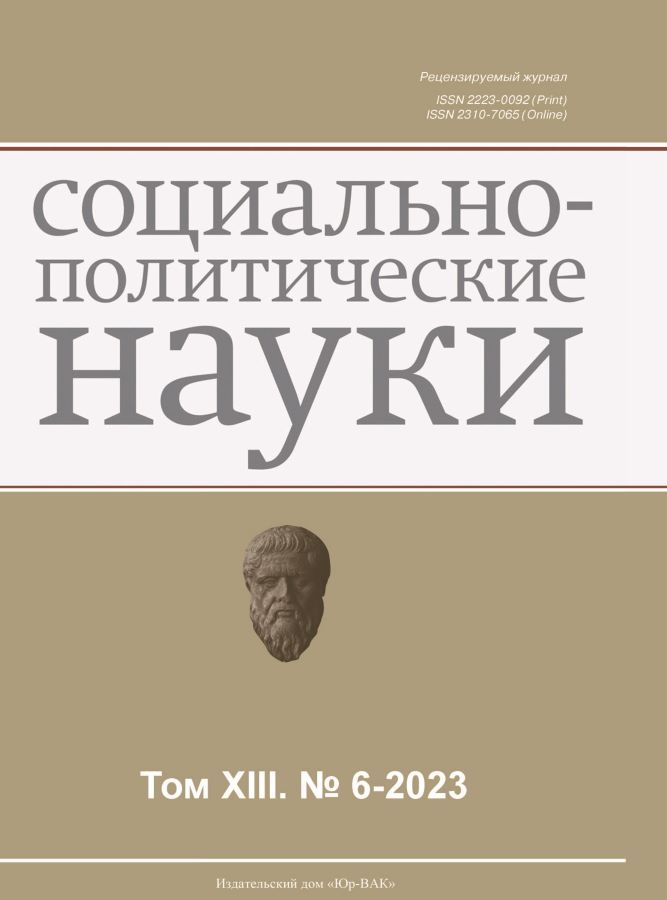Characteristics of Entrepreneurial Potential of Military Servicemen Released to the Reserve
- Authors: Yurasov I.A.1, Drokonova K.E.2
-
Affiliations:
- Financial University under the Government of the Russian Federation (Penza branch)
- Financial University under the Government of the Russian Federation
- Issue: Vol 13, No 6 (2023)
- Pages: 100-105
- Section: Economic Sociology
- URL: https://journals.eco-vector.com/2223-0092/article/view/626910
- DOI: https://doi.org/10.33693/2223-0092-2023-13-6-100-105
- EDN: https://elibrary.ru/BEHVHF
- ID: 626910
Cite item
Abstract
The article examines aspects that relate to the characteristics of the entrepreneurial potential of military personnel being transferred to the reserve. An analysis of the key elements that make up entrepreneurial potential was carried out, and the main characteristics reflecting the characteristics of the behavior and attitudes of military personnel were described. Based on the results of an empirical study, an assessment was made of the readiness and desire of reserve military personnel to be associated with entrepreneurial activity. Based on the data obtained, the prospects of military personnel in the field of entrepreneurship were determined.
Full Text
About the authors
Igor A. Yurasov
Financial University under the Government of the Russian Federation (Penza branch)
Author for correspondence.
Email: jurassow@yandex.ru
ORCID iD: 0000-0002-4884-6422
Dr. Sci. (Sociol.)
Russian Federation, PenzaKsenia E. Drokonova
Financial University under the Government of the Russian Federation
Email: KEDrokonova@fa.ru
ORCID iD: 0000-0003-4087-3941
2nd year master, Faculty of Social Sciences and Mass Communications
Russian Federation, MoscowReferences
- Alekseyonok A.A., Konstantinov V.A., Cairo Yu.V. Institutionalizing small business in the face of coercive spending. News of Tula State University. Humanities. 2019. No. 2. Pp. 72–77. (In Rus.)
- Bessonova T.I. Psychological adaptation of military pensioners to new activities. Scientific Notes. Electronic Scientific Journal of Kursk State University. 2023. No. 2 (66). Pp. 324–334. (In Rus.)
- Bondaletov V.V. Assessment of the socio-economic situation of military pensioners in modern Russia. Economics and Entrepreneurship. 2019. No. 12. Pp. 79–86. (In Rus.)
- Buglak S.V. Emeritus capital as an element of the funded pension system for military personnel in the Russian army. Economics and Entrepreneurship. 2020. No. 9. Pp. 808–812. (In Rus.)
- Veselov Yu.V. Trust in the entrepreneurial environment of St. Petersburg: experience in empirical research. Bulletin of St. Petersburg University. Sociology. 2022. Vol. 15. No. 4. Pp. 366–383. (In Rus.)
- Demchuk S.D. Some problematic issues of assigning pensions in the event of the loss of a breadwinner-military pensioner. Military Law. 2021. No. 1 (65). P. 130. (In Rus.)
- Dubograi E.V., Agapova E.G., Chernyshova L.A. Resocialization of military pensioners as an object of medical and sociological research. Social and Pension Rights. 2020. No. 1. Pp. 37–41. (In Rus.)
- Klimova I.Yu. Et. Features of the mental adaptation of military personnel of retirement age who did not take part in hostilities. Siberian Medical Bulletin. 2020. No. 2. Pp. 50–54. (In Rus.)
- Kulikova E.M., Berezin M.T., Batrakova L.G. Motivations for entrepreneurial activity. In: Economic potential of students in the regional economy: Materials of the International Scientific and Practical Conference. Ministry of Education of the Russian Federation, Yaroslavl State Pedagogical University named after K.D. Ushinsky. 2020. Pp. 300–304.
- Konovalov O.E. et al. Social functioning and health of military pensioners. Bulletin of the Medical Dental Institute. 2020. No. 1. Pp. 4–8. (In Rus.)
- Lavrova O.A. Resilience as a factor in the adaptation of military pensioners to age-related stressogenic factors. Interna tional Research Journal. 2021. No. 8-2 (110). Pp. 178–182. (In Rus.)
- Lavrova O.A. Characteristics of the emotional sphere of military pensioners as determinants of their adaptation readiness for changes in social status. South Russian Journal of Social Sciences. 2020. Vol. 21. No. 2. Pp. 111–125. (In Rus.)
- Nekrasov A.S. Entrepreneurial activity as an innovative form of development and implementation of human creative resources. News of Tula State University. Humanities. 2019. No. 3. Pp. 130–136. (In Rus.)
- de l’Escalopier N. et al. Retired French Military orthopedic surgeons’ opinions on their careers. Military Medicine. 2022. Vol. 187. No. 3-4. Pp. 499–503.
- Jayaram D. The Indian military and environmental affairs: an analysis through the lens of military change. Contemporary South Asia. 2020. Vol. 28. No. 3. Pp. 288–303.
- Pedlar D., Thompson J.M., Castro C.A. Military-to-civilian transition theories and frameworks. In: Military veteran reintegration: Approach, management, and assessment of military veterans transitioning to civilian life. C.A. Castro, S. Dursun (eds.). 2019. Pp. 21–50. URL: https://psycnet.apa.org/record/2019-72338-003
- Pezhynska O., Hevko V. Features of social and pedagogical work with military personnel. Social Work and Education. 2019. Vol. 6. No. 2. Pp. 169–176.
- Reis J. 2021. Civil-military cooperation: Integrated logistics in response to the COVID-19 crisis. Logistics. Vol. 5. No. 4. P. 79.
Supplementary files













